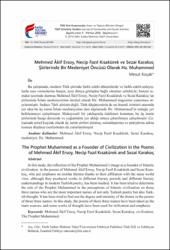| dc.contributor.author | Koçak, Mesut | |
| dc.date.accessioned | 2016-12-29T10:49:16Z | |
| dc.date.available | 2016-12-29T10:49:16Z | |
| dc.date.issued | 2016 | |
| dc.identifier.citation | KOÇAK, Mesut. "Mehmed Âkif Ersoy, Necip Fazıl Kısakürek ve Sezai Karakoç Şiirlerinde Bir Medeniyet Öncüsü Olarak Hz. Muhammed." FSM İlmî Araştırmalar İnsan ve Toplum Bilimleri Dergisi, 8 (2016): 203-222. | en_US |
| dc.identifier.uri | https://hdl.handle.net/11352/2425 | |
| dc.description.abstract | Bu çalışmada, modern Türk şiirinde farklı edebi dönemlerde ve farklı edebi anlayışlarda
eser vermelerine karşın, aynı dünya görüşüne bağlı olmaları sebebiyle, benzer temalar
üzerinde durmuş Mehmed Âkif Ersoy, Necip Fazıl Kısakürek ve Sezai Karakoç’un
şiirlerinde İslam medeniyetinin öncüsü olarak Hz. Muhammed imgesinin yansıması incelenmiştir.
Sadece Türk şiirinin değil, Türk düşüncesinin de en önemli isimleri arasında
yer alan bu üç ismin İslam medeniyetine dair algılarında Hz. Muhammed’in tuttuğu yer
belirlenmeye çalışılmıştır. Mukayeseli bir yaklaşımla irdelenen konunun, bu üç ismin
şiirlerinde hangi derecede ve yoğunlukta yer aldığı ortaya çıkarılmaya çalışılmıştır. Çalışmada
temel kaynak olarak üç ismin şiirleri alınmış, somutlaştırma ve pekiştirme adına
kısmen düşünce eserlerinden de yararlanılmıştır. | en_US |
| dc.description.abstract | In this study, the reflection of the Prophet Muhammed’s image as a founder of Islamic
civilization in the poems of Mehmed Âkif Ersoy, Necip Fazil Kısakürek and Sezai Karakoç,
who put emphasis on similar themes thanks to their affiliation with the same world
view, although they produced works in different literary periods and different literary
understandings in modern Turkish poetry, has been studied. It has been tried to determine
the role of the Prophet Muhammed in the perceptions of Islamic civilization on those
three names who are the most important names of not only Turkish poetry but also Turkish
thought. It has been tried to find out the degree and intensity of the theme in the poems
of those three names. In this study, the poems of those three names have been taken as the
main sources, and some works of thought have been used for reification and emphasis. | en_US |
| dc.language.iso | tur | en_US |
| dc.publisher | FSM Vakıf Üniversitesi | en_US |
| dc.rights | info:eu-repo/semantics/openAccess | en_US |
| dc.subject | Mehmed Âkif Ersoy | en_US |
| dc.subject | Necip Fazıl Kısakürek | en_US |
| dc.subject | Sezai Karakoç | en_US |
| dc.subject | Medeniyet | en_US |
| dc.subject | Hz. Muhammed | en_US |
| dc.subject | Civilization | en_US |
| dc.subject | The Prophet Muhammed | en_US |
| dc.title | Mehmed Âkif Ersoy, Necip Fazıl Kısakürek ve Sezai Karakoç Şiirlerinde Bir Medeniyet Öncüsü Olarak Hz. Muhammed | en_US |
| dc.title.alternative | The Prophet Muhammed as a Founder of Civilization in the Poems of Mehmed Âkif Ersoy, Necip Fazıl Kısakürek and Sezai Karakoç | en_US |
| dc.type | article | en_US |
| dc.contributor.department | FSM Vakıf Üniversitesi, Edebiyat Fakültesi, Türk Dili ve Edebiyatı Bölümü | en_US |
| dc.relation.publicationcategory | Makale - Ulusal - Editör Denetimli Dergi | en_US |
| dc.contributor.institutionauthor | Koçak, Mesut | |



















